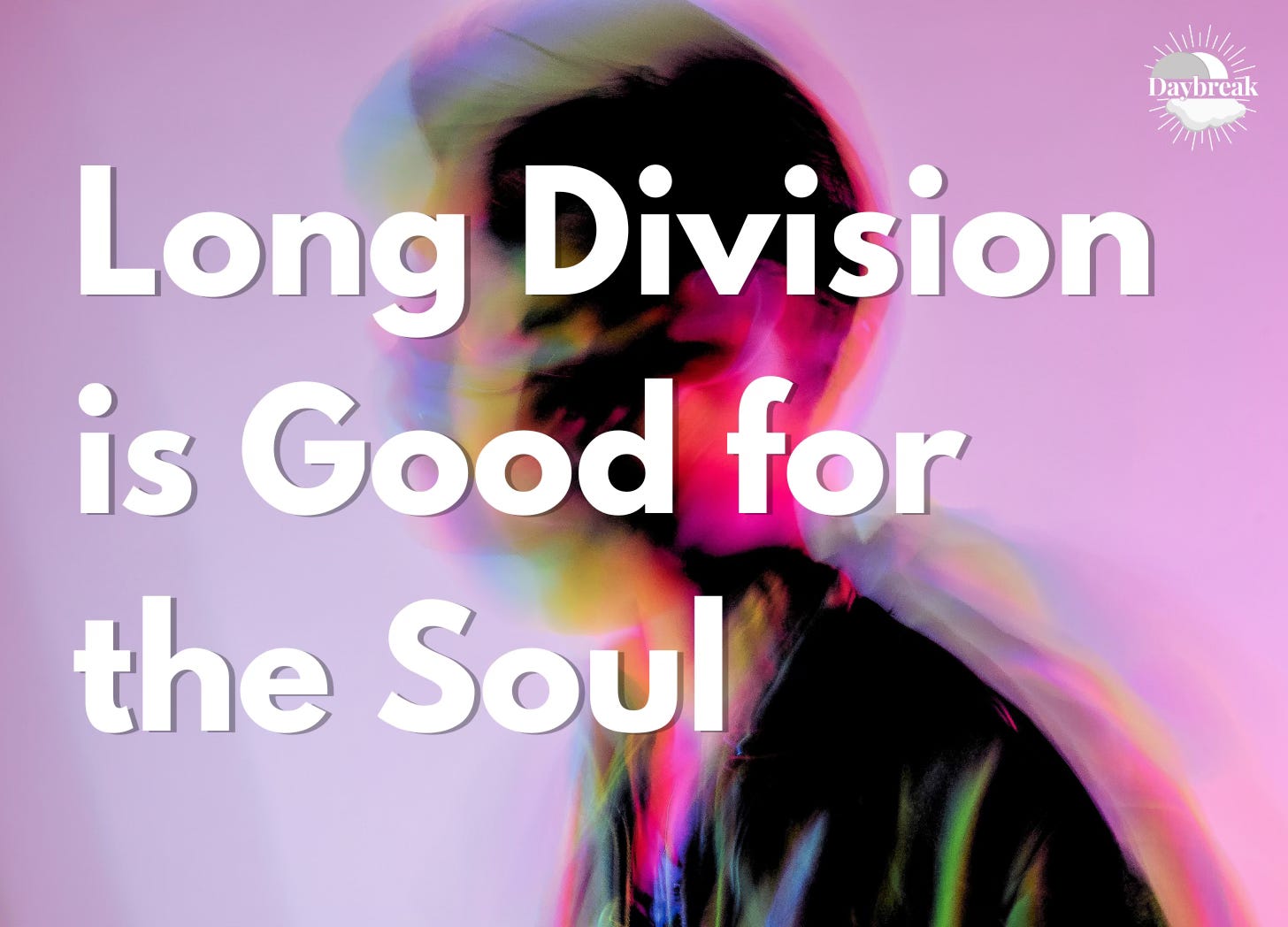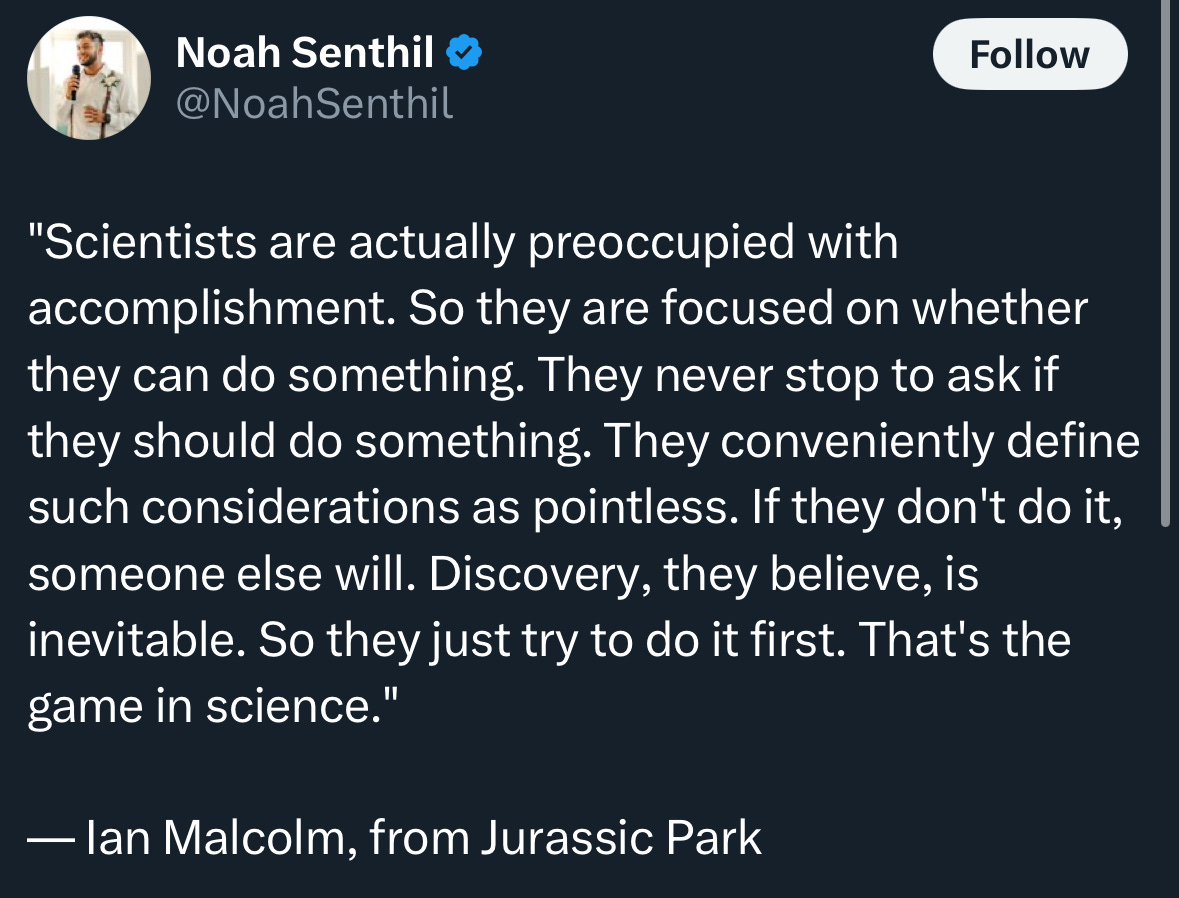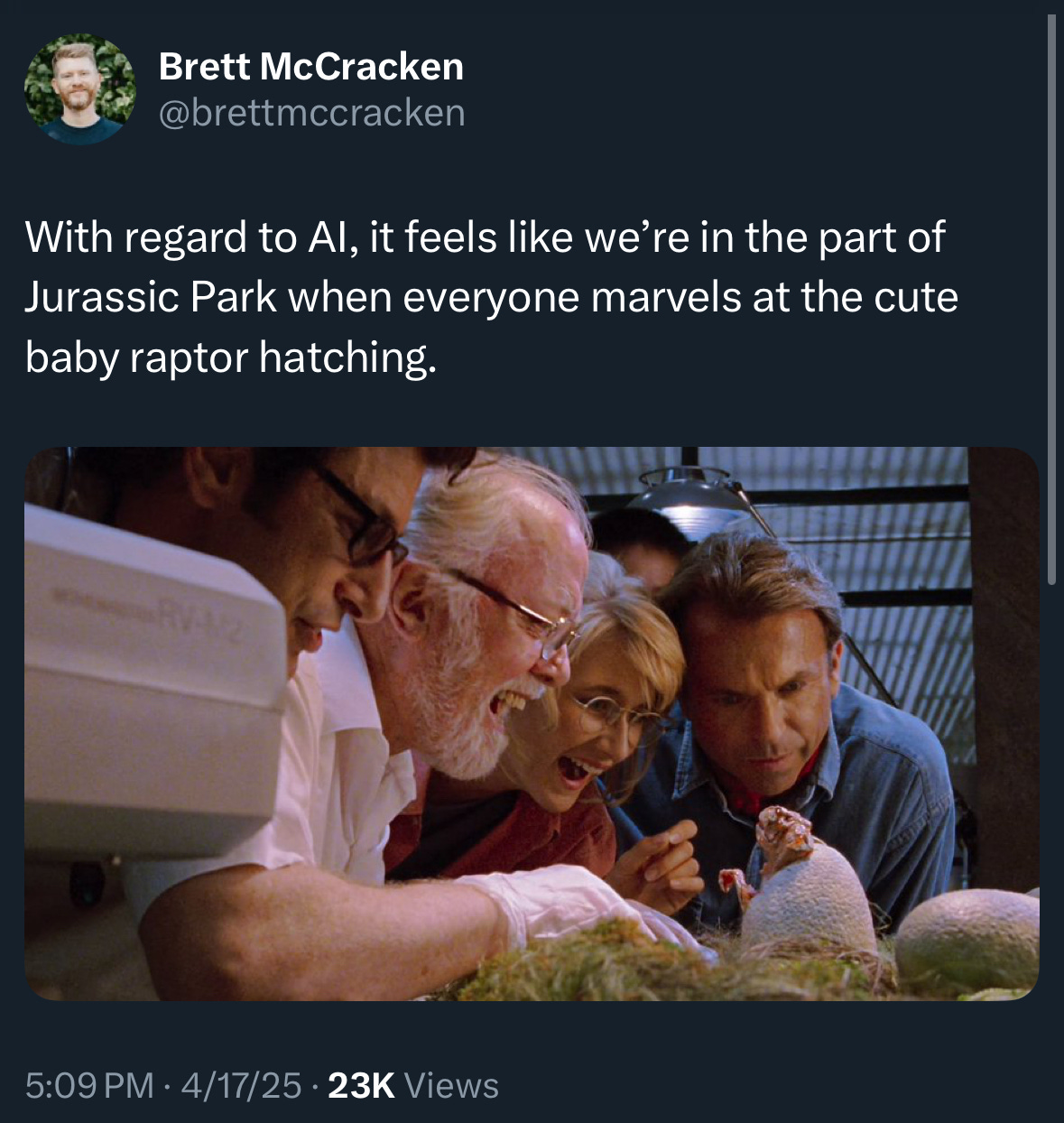(Photo by Matt Kirk on Unsplash)
Artificial intelligence is no longer science fiction. Neither is it the stuff of cool innovation anymore. It’s a staple of everyday life.
AI is among the top recent phenomena that have taken the world by storm.
For many, AI is a welcome breeze. Artificial intelligence offers “assistance” with basic and menial tasks. But we are moving past the advent of virtual help. We are increasingly rearranging our lives to leverage AI.
And the stakes are only getting higher
See this recent tweet from the Dept. of Energy:
Pride and ambition are always deadly partners when fueling technological advancement.
Consider this prescient line from the novel, Jurassic Park:
This is the conversation we need to be having about AI.
Though somewhat tongue-in-cheek, Gospel Coalition editor Brett McCracken makes a similar point (and keeps us in the hypothetical space of Jurassic Park):
I’ll cut to the chase here. I’m concerned for the road ahead as we push AI forward as a society.
Now, I’m not an alarmist. I don’t think we are headed toward AI taking over. But, it’s likely to present some disruptive moments down the line, in which the technology is left to run unattended.
Even further, just like all technology, sinners will find a way to abuse it, or rather, to abuse each other by wielding the latest technology at our disposal.
My friend Josh Rives has pondered, “Maybe the problem isn’t AI, but it’s that introducing AI into capitalism is like pouring water on a grease fire.” The demand for more can be blinding.
AI may lead us into a more turbulent days. But that’s not my primary concern.
In short, I’m concerned about how AI will cloud our purpose and function in this world as God’s image bearers.
In daily, everyday life, how will AI shape us?
Created to Create
Humans were designed to be stewards of creation. In one sense, God gives us the job assignment of sub-creating. But instead of spinning things into existence (only He can do that), our role is to cultivate what the Creator has made to amplify the beauty within.
Of course, some will say that AI is serving this express purpose. And to them, I basically agree. When leveraged like an efficiency multiplier, some versions of AI allow humans to focus on the heartbeat of cultivating.
But the AI conversation isn’t black and white. Which form of AI is helpful, and which may prove harmful?
Not All AI Is Created Equal
For the sake of simplicity, let’s consider three basic kinds of AI: machine learning, problem solving, and generative AI.
(here’s the part where I reassure you, I’m not an expert in this field)
Machine learning acts like a research assistant or data analyst. It combs through huge batches of information and organizes it for review.
It gathers for you.
Problem-solving AI solves an equation or an intellectual roadblock. The other day, I Googled, “ How much does an 8-foot-diameter, 18-inch pool weigh when filled with water?” just to see what Google AI would do. It gave me a step-by-step procedure for solving the math problem, culminating with the answer (about 4700 pounds).
This form of AI thinks for you.
Generative AI, on the other hand, aims to mimic creativity. This is AI that is capable of graphic design and digital animation. This AI can also spit out a 300-page novel in 30 seconds.
Here, AI attempts to create for you.
I believe machine learning is a net good for society. It reduces unnecessary slowdown in otherwise mindless work.
On the other hand, I fear the other two categories will have significant consequences on humanity.
Karen Swallow Prior says, “… when a new technology is developed, we tend to consider only what we gain from that technology while overlooking what we lose.”
We must ask the question, though AI has some benefits, what’s the cost?
We Need Long Division
Think about when you were in school and wanted to use a calculator for your math homework. It’s slow and tedious. Brutally boring.
But working through the process with pencil, paper, and brain was necessary for your learning and development. You had to grind as part of the maturing process, not merely for competence in math, but as a person.
A calculator, ironically enough, would have set you back. It would have yielded an answer more quickly, but would have stunted your growth.
Now, I’m not saying we ought to outlaw calculators. I’m just saying, there’s good in long division.
We struggle with moderation and patience. If something is good, we want all of it as soon as possible. We want results without the grind. We want success without hurdles or obstacles to overcome. We want glory without the sweat.
Christians are reminded that God often sends us down the path of the tortoise. He grows us and sanctifies us over long periods of time.
He can microwave our development if He wants, but He usually chooses the slow cooker effect. And, we know that God sanctifies us for the spiritual life through everyday means.
A challenging relationship at work will often soften our hearts, making us more compassionate in the long run. A physical trial will take us to our knees in prayer and, usually, increase our faith. And it’s often when we look back on long stretches of monotony in life that we see God teaching us simplicity, humility, and contentment.
AI launches us from A straight to Z with no growth to show for it. It invites us to teleport when we are meant to journey.
Remember, our task is not to maximize, but to cultivate. To be cultivators of God’s good creation, we have to patiently grow into the task.
Cautious but Confident
I don’t intend this post to be a polemic against AI—I likely use some version of it daily, just like you.
But we’ve got to be aware of the cost of doing business in the years to come.
As Christians, we are people who are grounded in hope. Because Jesus has declared the future secure, we know today is not outside of his control either.
AI won’t be the downfall of humanity. In one sense, that moment has already passed in a distant and forgotten garden. But the downfall is not the end of the story.
King Jesus will continue to reign. No human innovation will thwart his plans nor triumph over his church.
Where human sin reigns at the prodding of the enemy, King Jesus is fighting back the darkness—redeeming that which was marred and gradually making it whole.
Our calling is to operate with caution, but to never waiver in our confidence in him.
Sober and Measured
To close, I want to simply offer some final food for thought as we consider our calling as humans and the rising tide of this advancing technology.
How will we swim in these new waters?
1) AI threatens to take jobs away.
If AI can do what we can do better, faster, more quickly, and with fewer errors, companies will prioritize it. No question.
2) AI insults artists and stifles our sense of beauty.
Artists are a treasure for the human race. They remind us, more than anyone, of God the Wonderful Creator. AI has already begun muddying the water of music, writing, and visual media, and it’s only increasing from here.
3) AI will commodify the human race.
That sounds more dystopian than I intended, but follow the logic. AI will borrow the worst from social media algorithms and dial it up to 11. AI will learn how to captivate the internet population and adapt to enthrall us further.
4) AI places us on conveyor belts of self-catering.
Whereas we already struggle with the temptation to put ourselves at the center of the universe, AI is eager at our beck and call for whatever we fancy.
5) AI will make us dumber.
With the increasing use of AI, the population, a people already bent toward laziness, will become less curious, less ambitious, and less competent to reason.
6) AI will allow evil people to prey on the vulnerable and disadvantaged.
AI has no moral compass. It can operate with parameters and restrictions coded in, but can’t distinguish right from wrong when safety nets fail.
7) AI will never be truly reliable.
AI will grow smarter and more adaptive. But as the population becomes more dependent, fewer people will be able to fact-check the results. The more complacent we become, the less immune we are to calling out errors and falsehoods.
8) AI is incapable of wisdom.
Whereas AI can offer information or thinking power, it can’t discern. At best, it can reproduce a decision-making flow chart, but it will always lack the human element—emotion and feeling.
Though capable of incredible brain power, this technology has no soul.
Don’t be fooled. AI cannot compete with personhood.
But how much of our humanity are we prepared to yield for the sake of “progress?”
In what areas of your life in which you could use AI, should you say, “No thanks?”
How can you be part of the resistance?








